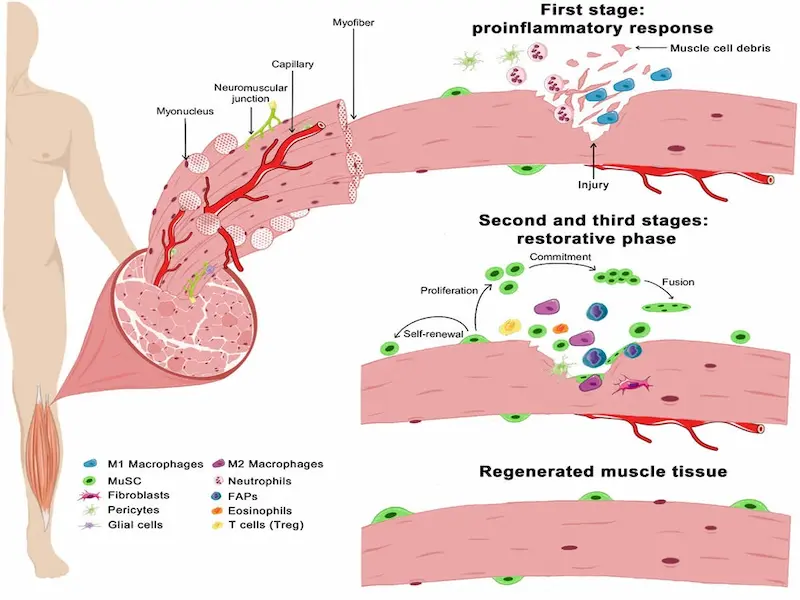
PROMO!
First order? Get 10% OFF with this code: 1storder
Written by

GHRP-6 is a peptide linked to muscle growth and bulking in scientific research. It stimulates growth hormone release, which supports muscle development and increases appetite in lab studies.
GHRP-6 is for research use only and not intended for humans. Research shows it may aid body composition and muscle repair under controlled conditions.
Peptide Works supplies GHRP-6 strictly for research purposes, helping scientists worldwide access trusted bulking peptides.
To understand why GHRP-6 stands out as a potential bulking peptide, it’s essential to first examine how growth hormone operates within the muscle-building process.
Explore GHRP-6 from Peptide Works, a bulking peptide known to support growth hormone release and appetite regulation for enhanced muscle development.

Growth hormone signals the body to increase muscle size by boosting protein synthesis and raising levels of IGF-1, which helps with lean muscle gain.
Stronger IGF-1 levels can support faster muscle recovery and better fat metabolism, both important during bulking cycles.
Experts note growth hormone shifts body composition by promoting new muscle cells and reducing fat storage without affecting bone density for adults.
Some peptides like GHRP-6 are linked to increased growth hormone release, making bulking peptides popular choices for research on muscle growth and metabolic support.
With growth hormone’s role established, the next piece of the puzzle is muscle recovery a process that reinforces each gain made during training.
Muscle recovery is vital during bulking because it helps repair muscle fibers and build strength. Rest and good nutrition are the main ways to support this repair process.
Ipamorelin is a peptide that boosts natural growth hormone release, which helps muscle repair and recovery over time.
MK677 raises IGF-1 levels in the body, enhancing tissue repair and lean muscle growth, both important for bulking. GHRP-6 has also shown potential for improving energy metabolism in muscles, which further supports overall muscle function.
These peptides have been studied for their gradual effects on bulking when used within controlled research protocols focusing on diet and exercise variables.
This recovery process ties directly into a deeper layer of muscular growth the body’s ability to repair tissue at the cellular level.
Discover MK677 from Peptide Works, a powerful growth hormone secretagogue that promotes IGF-1 levels to aid lean muscle gain and tissue repair.

Tissue repair plays a crucial role in bulking by enabling muscles to recover and adapt after intense physical activity. When muscle fibers undergo stress or minor damage during workouts, the body repairs them by creating stronger, thicker fibers.
This repair process is essential to increase muscle size and endurance. Effective tissue repair also enhances metabolic functions, helping the body optimize fat use while supporting lean muscle growth.
Additionally, adequate repair time reduces fatigue and the risk of injury, ensuring consistent progress in bulking phases.
Once tissue repair is underway, the spotlight turns to metabolic activity the engine driving energy, growth, and nutrient use.
Explore Ipamorelin from Peptide Works, a selective peptide that stimulates natural growth hormone release to support recovery and muscle regeneration.
Metabolic functions play a crucial role in bulking by controlling how the body converts food into energy and builds muscle. A faster metabolism can burn calories more quickly, making it harder to maintain the calorie surplus needed for bulking.
Muscle growth depends on a balanced metabolism that supports energy use and protein synthesis. Peptides such as MK677, GHRP-6, and Ipamorelin may support metabolism and muscle gain by stimulating hormone release related to these processes.
Peptide Works offers these peptides, which have been studied for their metabolic benefits in research focused on muscle growth and bulking.
With metabolism aligned, another essential factor rises to the surface the body’s ability to synthesize new muscle proteins efficiently.

Protein synthesis is the process where the body builds new muscle proteins, essential for muscle growth during bulking. Growth hormone release plays a key role in regulating this process, supporting muscle repair and growth.
Peptides like MK677, GHRP-6, and Ipamorelin have been studied for their ability to stimulate growth hormone, enhancing protein synthesis and boosting anabolic responses. Using these peptides can support more efficient muscle gain and help optimize bulking strategies.
Each bulking peptide aims to influence this critical step. But for bulking to succeed long-term, it must also activate robust anabolic responses the final stage of the growth equation.
Anabolic responses are crucial for bulking because they help the body build muscle after exercise. These responses convert nutrients into muscle, supporting lean mass gain.
Hormones such as growth hormone and IGF-1 play a key role in muscle repair and growth.
Research shows that MK677, GHRP-6, and Ipamorelin can enhance these hormone levels, potentially boosting muscle growth when used carefully.
Maintaining good nutrition and regular exercise supports these natural anabolic processes, which are essential for effective bulking.
Having explored the science behind peptides, hormones, and growth, researchers are now considering where this evolving field is headed and what role the bulking peptide may play in shaping the future of muscle development.
The future of bulking peptides holds great promise for advancing muscle growth and recovery. Research continues to uncover how peptides like MK677, GHRP-6, and Ipamorelin can safely enhance anabolic responses, protein synthesis, and metabolic functions.
While these peptides are strictly for research use, their potential to support efficient bulking cycles and improved muscle quality is clear. Combined with proper nutrition and training, continued peptide research may unlock new strategies for lean muscle gains.
As science progresses, bulking peptides could play an increasingly important role in muscle development and body composition optimization.
With new studies on the horizon and technology advancing rapidly, the potential of each bulking peptide is far from maxed out. The next breakthroughs may not just redefine what’s possible in muscle growth they may rewrite the rules entirely.
All products discussed are supplied for research purposes only and are not intended for human use.
[1] Micic D, Popovic V, Kendereski A, Macut D, et al. Growth hormone secretion after the administration of GHRP-6 or GHRH combined with GHRP-6 does not decline in late adulthood. Clin Endocrinol (Oxf). 1995 Feb;42(2):191-4.
[2] Lei T, Buchfelder M, Fahlbusch R, Adams EF. Growth hormone releasing peptide (GHRP-6) stimulates phosphatidylinositol (PI) turnover in human pituitary somatotroph cells. J Mol Endocrinol. 1995 Feb;14(1):135-8.
[3] Raun K, Hansen BS, Johansen NL, Thøgersen H, et al. Ipamorelin, the first selective growth hormone secretagogue. Eur J Endocrinol. 1998 Nov;139(5):552-61.
[4] Murphy MG, Plunkett LM, Gertz BJ, He W, et al. MK-677, an orally active growth hormone secretagogue, reverses diet-induced catabolism. J Clin Endocrinol Metab. 1998 Feb;83(2):320-5.
ALL CONTENT AND PRODUCT INFORMATION AVAILABLE ON THIS WEBSITE IS FOR EDUCATIONAL PURPOSES ONLY.
DISCLAIMER: These products are intended solely as a research chemical only. This classification allows for their use only for research development and laboratory studies. The information available on our Peptide Works website: https://peptide-works.com/ is provided for educational purposes only. These products are not for human or animal use or consumption in any manner. Handling of these products should be limited to suitably qualified professionals. They are not to be classified as a drug, food, cosmetic, or medicinal product and must not be mislabelled or used as such.
Peptide Works
Related Articles

What are the Best Cognitive Peptides?
Cognitive peptides are short chains of amino acids that researchers are exploring for their potential effects on brain function. They

Achieving increased skin pigmentation without prolonged sun exposure has been demonstrated with Melanotan peptides in research. Two commonly studied options,

Can PTD-DBM Hair Growth Peptide Stop Balding?
Hair thinning and balding affect millions worldwide, often leading to frustration and limited options. This challenge has driven researchers to